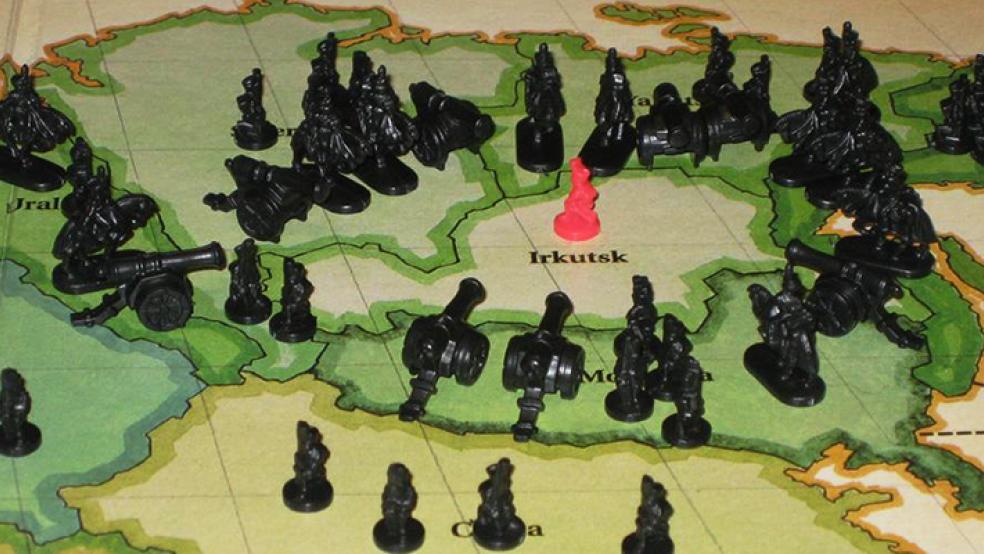The Ukraine deal was never going to work. Even President Obama, at last, found an off-ramp he didn’t believe in. Thus two weeks after an agreement to disarm and disband pro-Russian separatists, those separatists remain armed and banded, backed by an unrepentant Russia.
Russia has successfully defied the international system not just because it is stronger on the ground, but because it found a loophole in the rules of international behavior. In eastern Ukraine and the Crimea, the rule against annexing another state is clouded by the rule supporting ethnic self-determination. That cloudiness has muted the Western reaction and been mildly humiliating at the same time – a bonus for Russian President Vladimir Putin. But the US should remind Russia that for large, amorphous, multi-ethnic states, the principle of ethnic self-determination is exceedingly dangerous.
Related: Why Putin’s Adventure in Ukraine Is Doomed
When he first imposed sanctions on Russia in March, Obama stated,
“The basic principles that govern relations between nations in Europe and around the world must be upheld,” among which were “sovereignty and territorial integrity.”
That’s all fine; but those international rules and norms are not backed up by a legal system with bewigged judges, surly bailiffs, and a stop-and-frisk policy. They’re backed up largely by mutual consent and the belief that if they’re violated blatantly enough and long enough, America will do something. But that something is often expensive; though a superpower, the US clearly doesn’t have the power to enforce every rule. Consent is thus critical: if states refuse to comply with the system, and start to push the envelope, then order gets expensive very quickly.
So how do we get Russia to comply with American norms? To an anti-status quo power, our international rules and norms can seem self-serving, because…they’re a little self-serving. The World Trade Organization and International Monetary Fund promote capitalism, the World Bank promotes development and democracy, and the UN mostly protects the world as it stands today – in other words, the status quo. We don’t have international institutions like the IMF handing out massive loans to countries that accept, for example, the basic guidelines of communism.
Related: With Ukraine on the Brink, the West Plays the Long Game
Modern Russia is an anti-status quo power. When President Obama mentions “rules” and “norms” like sovereignty, Putin will say, but wait! NATO violated these self-same norms when it took Kosovo away from Serbia in 1999 and 2008; what Russia is doing in Ukraine is at exactly what the West did in the Balkans.
It’s a standard revisionist trick, exploiting the rules of the international system in a place where there’s an appearance of inconsistency. That inconsistency throws into doubt their legitimacy, and increases the likelihood they can be renegotiated in a more favorable way. And parsing out the truth can be difficult.
Kosovo was fundamentally different. Yes, territorial integrity is indeed one of the foundational principles of the modern European system, but extreme human rights violations can trump it – and ethnic self-determination can be the result. In Kosovo, the United States and NATO intervened after Serbia had effectively forfeited the right to rule minorities after a near-decade of war crimes against the Croats, Bosnians, and others.
Related: Russia’s Military Bear Is a Paper Tiger
There’s no serious argument that ethnic Russians were being widely persecuted in Donetsk and other eastern Ukrainian cities. Nor does it much matter, frankly, since Russia is just using that as an excuse to play realpolitik in a place where Moscow has vastly more power on the spot. True, in ethnically Russian cities like Donetsk, it can flaunt the rules. But there are plenty of places where Russia doesn’t have more power on the spot – and the two should be linked.
If the US wants Russia to buy back into the idea of territorial sovereignty in Ukraine, it must remind Russia that ethnic self-determination cuts both ways. The rules of the system are not just a hypocrisy of the reigning superpower to lighten its burden, but have real benefits, not least for Russia. Because its borders, in many places, make no sense.
Russia stands on disputed territory everywhere: in the southern Kurile Islands off Japan, in Abkhazia and South Ossetia off Georgia, on restive Muslim areas in the Caucasus, and now in Crimea. Closer to Central Asia, it rules several additional Muslim populations like the Tatars, who don’t have their own states only by the whim of early Soviet cartographers. More than 20 percent of Russia’s population are minorities, since historically Russia’s borders have fluctuated wildly. It thus needs reminding that discarding territorial integrity can have serious consequences elsewhere.
- The United States should issue a strong statement supporting Japan’s ownership of the southern Kurile Islands.
- Reengage—loudly--with the Europeans and Tbilisi launching Georgia’s NATO Membership Action Plan.
- Refer to Chechnya and Dagestan as “disputed” areas, at the UN and other multilateral fora.
Nothing would rattle Russian confidence like the prospect of United States officials meeting – even expressing interest in meeting – opposition leaders in Dagestan. And perhaps the Tatars should have their own state as well. Maybe the UN should look into it.
Yes, there are many ethnic Russians in Europe. There are also many non-Russians in Russia. Let the Kremlin chew on what real revisionism would look like.
Top Reads from The Fiscal Times:
- New Benghazi Emails Could Derail Hillary in 2016
- Ditching Employer Health Coverage Could Save Companies $700B
- The High-Stakes Fight Over How to Measure CEO Pay






